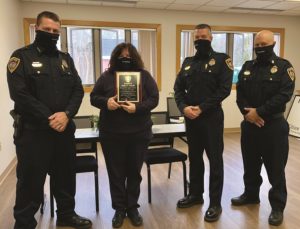EASTHAM — Firefighters get trucks and hoses; police officers, cuffs; EMTs, those screaming sirens. But 911 dispatchers? To them goes little glitz, little drama, still less recognition. The job may sound like a telephone operator’s, nothing more.
But as Head Dispatcher Julie Austin retires, she takes with her an encyclopedic knowledge of Eastham’s geography and its quirks, a rare knack for keeping a cool head in a crisis, and 32 years of experience serving — and saving — the Eastham community.
The primary role of a dispatcher is, yes, to dispatch police, fire, and EMS units to 911 calls. But Austin’s responsibilities went far beyond telling units where to go. For three decades of Eastham residents in crisis, Austin’s was the first voice to crackle to life on the phone line.
Dispatchers are trained to give tele-medical help in every situation from choking to childbirth. Awaiting responders’ arrival, Austin has talked wives through their husbands’ CPR, stab victims through wound care, and people off ledges.
“Those dispatchers really are the first line of defense when it comes to calling in an emergency,” said Eastham Police Chief Adam Bohannon. “Often, the person is quite possibly having the worst day of their life on the other end of the phone. And it’s critical that a dispatcher is able to calm a person to a point where we can most effectively help.”
That is a skill at which Austin — steely, decidedly no-fuss — proved herself particularly adept. “It’s 99-percent common sense,” she said. “The other one percent — well, the job’s not for everyone.”

Austin has taken her responsibility as that first line of defense seriously. It, too, has taken a serious toll on her. “It can be very emotional,” she said. “You wonder why I’m retiring?”
Austin’s career has been full of midnight-to-8-a.m. shifts, spurts of chaos interspersed with hours of silence. (How does she pass the time in slow moments? Easy: Criminal Minds and Chicago P.D. on the police station TV.)
She didn’t see that career coming. In March 1988, Austin was looking for a change. She was a single mother in need of a stable job with benefits and a place to put down roots. She’d worked for 15 years in restaurants and precisely zero in dispatching — but, in Eastham, she applied for and won an open position.
“It just so happens I was a duck in water,” she said. Over the next 32 years, she would serve as firearms licensing clerk, records clerk, and head clerk. And she’d watch those jobs change before her eyes.
In her first days in Eastham, she had at her disposal, at the old police headquarters, just “two microphones on pieces of wood on the desk” — one microphone for cruisers, one to communicate with Barnstable County.
In 1990, the department upgraded to a full-fledged radio console that allowed instant communication for dispatchers. Soon after, the department adopted its current computerized dispatch system, with GPS navigation for officers to respond to incidents and a wealth of other technological tools.
But for all the dollars poured into those newfangled systems, they couldn’t replace one of the department’s key resources: Austin. “She knows the community like the back of her hand,” said Chief Bohannon.
“By the end of my career,” said Austin, “I could probably tell you how to get to any particular place or any address in Eastham. You get to know your community, which doesn’t always happen in larger communities or in urban areas where they rely on technology to tell them where they’re going. I know that we became intimately familiar with our towns and the people in it. And that helps in ways that you can’t even imagine.”
Austin isn’t at liberty to get specific about episodes from her time at the dispatcher’s desk. (“I knew a lot,” she said, “and somehow my hairdresser still always knew more than me.”) But the length of her tenure there, coupled with a steel-trap mind — she attaches a date to every crime and rescue story she tells — meant that she could send even the greenest officer cruising down Eastham’s back roads with full confidence. Even if a 911 caller couldn’t make any noise, she could often tell from the address who was on the other end of the line.
And Austin dealt with the community’s more quotidian needs, too. She kept mentally ill residents company on the line as they awaited help. She talked elderly citizens through turning up their heat in the winter months.
“A lot of times, people simply don’t know who to call,” she said. “So, they call us.”
One afternoon, a woman rang in, hysterical. Austin got her to stop screaming “Oh, my God! Oh, my God!,” calmed her down, and waited for her news. Was someone dead? Critically injured? In danger? No. The woman had locked her keys in the car, and now her groceries were trapped inside.
“Yeah,” said Austin. “I dealt with just about everything.”
“Julie Austin is one of the hardest working employees in our building,” said Chief Bohannon. “She was literally willing to work around the clock to keep our department running, whether that was working double shifts on holidays or working on very little sleep. She was willing to do whatever was necessary to make sure we had enough dispatch coverage to keep our department running properly. That’s hard to find.”
Austin, who officially retired on Dec. 2, is staying on as a part-time dispatcher while her replacement, Melanie Beaulieu, is trained for the head dispatcher position. In the next few months, she will step back entirely.
“Thirty-two years is a long time,” said Austin. “I think you get to a point where we deal with a lot of harsh reality on a daily basis, and you just say uncle. It’s time. Let the young people handle it.”


